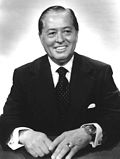

This is a list of Hispanos, both settlers and their descendants (either fully or partially of such origin), who were born or settled, between the early 16th century and 1850, in what is now the southwestern United States (including California, Arizona, New Mexico, Texas, southwestern Colorado, Utah and Nevada), as well as Florida, Louisiana (1763–1800) and other Spanish colonies in what is now the United States. Governors and explorers, who spent time in these places serving the Spanish crown but never settled in them as colonists, are not included, although they also helped shape the history of the present United States. This list shows notable people of Spanish and Mexican origin who lived in the Hispanic colonies now part of the United States, as well as their descendants.
| Lists of Americans |
|---|
| By US state |
| By ethnicity |
|
|
These are persons who were born and/or lived, and died, in the Spanish or Mexican territories that later were incorporated in the United States. They were never Americans in the sense of persons born, raised or naturalized in the modern United States.



When the Spanish and Mexican territories were incorporated as part of the United States, their inhabitants automatically acquired American citizenship. Louisiana (which was Spanish between 1762 and 1800, when Spain gave back the territory to France) was ceded to the US by France in 1803, Florida was sold by Spain in 1819 and the Southwest passed to the US after the Mexican–American War (1846–1848) by the terms of the Guadalupe Hidalgo Treaty, while Texas separated from Mexico in 1836 and was annexed by the United States on December 29, 1845.






These are descendants of Spanish and Mexican settlers who were born in the United States after 1803 in Louisiana, after 1819 in Florida and after 1850 in the Southwest:




